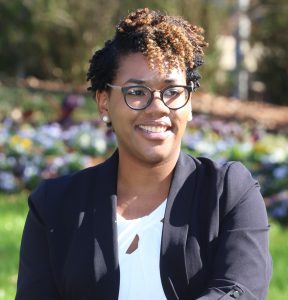Please tell us about your career pathway to date (positions and institutes).
I am a nutritional epidemiologist. After completing my PhD in epidemiology at the University of Alabama at Birmingham in 2015, I moved to the Midwest! I completed a NCI-funded and USDA-funded postdoctoral research fellowship with the Institute for Health Research and Policy at the University of Illinois at Chicago. In 2018, I joined the faculty of the Department of Kinesiology and Community Health at the University of Illinois at Urbana-Champaign.
How would you briefly describe your current research/job to someone who is not familiar with your field of study/work? What is your main research interest?
I research structural barriers to healthy eating in low-resourced and historically underserved communities in urban settings. Examples of structural barriers include limited access to healthy food retailers (i.e., grocery stores), racism/discrimination, and community violence. I’m an assistant professor on the tenure track, so I am required to conduct research, teach graduate-level public health courses, and mentor students. Currently, I am principal investigator of the Food Access Research (FAR) lab at the University of Illinois. My lab uses epidemiologic, geo-spatial, and community-based participatory research (CBPR) research methods to examine food access and its influence on food purchasing behavior, dietary intake, and chronic disease risk.
What are the main barriers you encounter/experience when conducting research, or what information/skills do you lack to conduct high quality research?
My research is quite interdisciplinary, so I often find myself in the position where I lack the skills to conduct a specific component of the research I want to conduct. For example, I recently received a NIH grant to study violent crime (e.g., homicide, aggravated assault, armed robbery) in Chicago, IL and its influence on food access and food purchasing patterns among African American families. I have limited experience with crime mapping, criminal justice, and public health law. Thus, I am taking short courses and applying for summer training sessions on these topics to expand my skillset. I believe high quality research requires input from experts with a broad range of interests and skills. As researchers, we have to constantly broaden our skillset and professional network because most public health issues are complex and require complex solutions.
What could help you as a student/ECR to further develop/grow in your current position?
A larger professional network. Building a decent sized professional network is crucial to students and ECRs who are interested in an academic research position. Academic research is highly collaborative. Having a sufficient number of collaborators that you trust can lead to substantially greater research output (i.e., publications, grant submissions). I am actively working on expanding my professional network and identifying new collaborators who are ECRs and more established researchers.
What do you think will be the next most important development in the nutrition and/or physical activity field?
Given the current social and political climate in the USA, I expect more research will be conducted on structural inequities and their influence on diet and physical activity behaviors. Structural racism and racial injustice are now being treated as major public health issues. I expect researchers and funding agencies in the USA, and other areas the world, are going to study these issues in an effort to better understand how they create and perpetuate health inequities.
You can get in touch with Chelsea via Twitter @DrCRSingleton or email [email protected]


